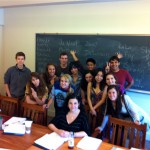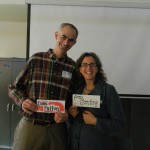Response to “Belonging”
Forums › 2023 Summer Seminar › Belonging 2023 Summer Seminar Responses: due JUNE 8 (or earlier) › Response to “Belonging”
-
AuthorPosts
-
-
May 26, 2023 at 1:36 pm #31723
I was deeply impressed with Nora Krug’s Belonging on several different levels.
Medium
I’m a huge fan of graphic novels and Belonging effectively utilizes the format to create a unique and intimate narrative. Small choices like the use of graphite font and elements of a scrapbook create a more inviting and intimate memoir than a text-only version. Like Maus, choice in font, image and color allow Krug to move seamlessly between past and present, multiple locations, and different branches of the family tree in a way that mirrors human memory and discovery.Voices of the 3rd Generation
Where Spiegelman provided space for the voices of the second generation, Krug’s work gives voice to the 3rd. As the Holocaust moves from memory to to history – for perpetrators, bystanders, victims, and survivors – her questions and search for answers resonate. The way she wrestles with challenges such as – “how do I understand and move forward with my family’s culpability in the Holocaust? My country’s responsibility? How much, or little, were my family responsible (or willing) participants in the Holocaust/ What does that mean for me?” – are specific to Germans struggling with the legacy of the Holocaust. But they are also very universal in a younger generation’s attempts to understand their connection to their country’s or family’s perpetration of hard, traumatic, or deadly history. Her quest for understanding and working through her family’s wall of silence were admirable, and reflected my own student’s questions when they are trying to understand their relationship with traumatic histories in the US such as slavery, segregation, Hiroshima, the removal of Indigenous people, Vietnam, and Abu Ghraib.However, it also struck me that her quest for understanding is inherently privileged because she and her family were German, and not Jewish.
Heimat
Finally, I love the say Krug focused her narrative on the idea of “heimat”. The concept of heimat struck me as a quintessentially German, a tie to history, land, environment, and feeling that reminded me of a sense of gemütlisch (cozy). Her heimat both exists in the historical sense and yet is disrupted, destabilized, and perhaps unable to be trusted as “real” because of the haunting legacy of WWII and the Nazis. How can a place of such beauty and safety for some, simultaneously have produced the ugliness and death of the Holocaust? And how does she understand her heimat when she herself is displaced from her family’s historical home, recreating a new home in the US?Krug’s focus on the heimat also stands in contrast to the equally quintessential Jewish experience of displacement and diaspora. For centuries in European Jewish history, Jewish populations lived with legal, political, and social discrimination that prevented them from establishing their own heimats, reinforced by explosions and programs. Even for assimilated Jews, the Holocaust was a deadly reminder that assimilation did not mean protection, belonging, or acceptance. The ability to move, re-make, and re-create when forced (or able) has been a part of the Jewish experience since the beginning of the Diaspora.
-
June 7, 2023 at 3:43 pm #31782
I also noticed a similar design and thought of “Maus.” I have only read those two graphic novels, but both excite me to read more.
-
June 13, 2023 at 10:50 am #31834
Kelly,
I loved this line you wrote, “However, it also struck me that her quest for understanding is inherently privileged because she and her family were German, and not Jewish.” This is something that I was not thinking about at the time of reading it, but something that I had discussed afterwards as I shared my reading experience with my friend Martin. He was born in 1935 in Germany and his family (brother and father) were involved in the war. He and I speak about his overcoming the hatred that was taught to him during that time and coming to terms with it. The last time he and I spoke, he said something similar to a group of sophomores at my school that he was visiting. Thank you for pushing my thinking about this text further.
-
-
AuthorPosts
- You must be logged in to reply to this topic.
Recent Replies
Recently Active
-
Active 2 hours, 42 minutes ago
-
Active 1 day, 2 hours ago
-
Active 1 day, 5 hours ago
-
Active 1 day, 22 hours ago
-
Active 1 week ago
- View All Members






